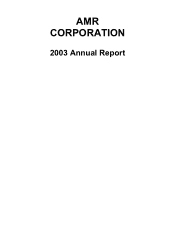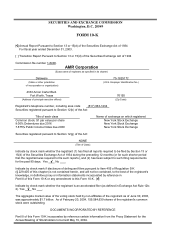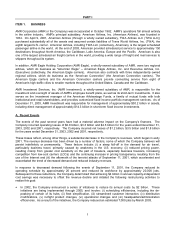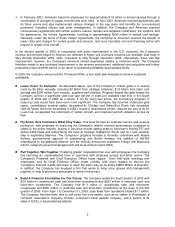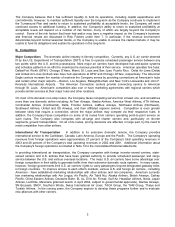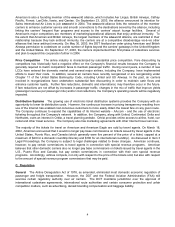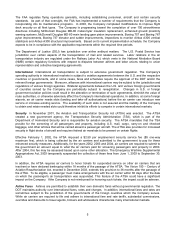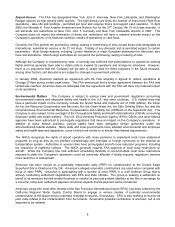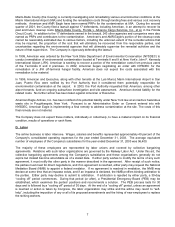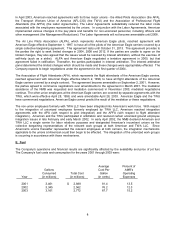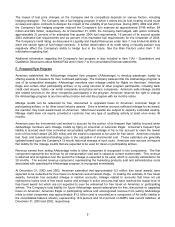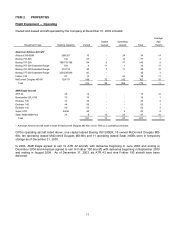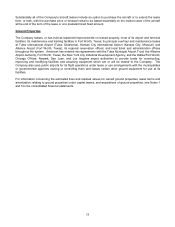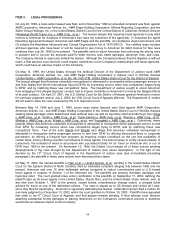American Airlines 2003 Annual Report Download - page 7
Download and view the complete annual report
Please find page 7 of the 2003 American Airlines annual report below. You can navigate through the pages in the report by either clicking on the pages listed below, or by using the keyword search tool below to find specific information within the annual report.5
The FAA regulates flying operations generally, including establishing personnel, aircraft and certain security
standards. As part of that oversight, the FAA has implemented a number of requirements that the Company is
incorporating into its maintenance programs. In 2003, the Company completed modifications to improve flight
deck security on all fleet types. The Company is progressing toward the completion of over 100 airworthiness
directives including McDonnell Douglas MD-80 metal-mylar insulation replacement, enhanced ground proximity
warning systems, McDonnell Douglas MD-80 main landing gear piston improvements, Boeing 757 and Boeing 767
pylon improvements, Boeing 737 elevator and rudder improvements, inspections to monitor Airbus A300 vertical
stabilizers and Airbus A300 structural improvements. Based on its current implementation schedule, the Company
expects to be in compliance with the applicable requirements within the required time periods.
The Department of Justice (DOJ) has jurisdiction over airline antitrust matters. The U.S. Postal Service has
jurisdiction over certain aspects of the transportation of mail and related services. Labor relations in the air
transportation industry are regulated under the Railway Labor Act, which vests in the National Mediation Board
(NMB) certain regulatory functions with respect to disputes between airlines and labor unions relating to union
representation and collective bargaining agreements.
International International air transportation is subject to extensive government regulation. The Company's
operating authority in international markets is subject to aviation agreements between the U.S. and the respective
countries or governments, and in some cases, fares and schedules require the approval of the DOT and/or the
relevant foreign governments. Moreover, alliances with international carriers may be subject to the jurisdiction and
regulations of various foreign agencies. Bilateral agreements between the U.S. and various foreign governments
of countries served by the Company are periodically subject to renegotiation. Changes in U.S. or foreign
government aviation policies could result in the alteration or termination of such agreements, diminish the value of
route authorities, or otherwise adversely affect the Company's international operations. In addition, at some foreign
airports, an air carrier needs slots (landing and take-off authorizations) before the air carrier can introduce new
service or increase existing service. The availability of such slots is not assured and the inability of the Company
to obtain and retain needed slots could therefore inhibit its efforts to compete in certain international markets.
Security In November 2001, the Aviation and Transportation Security Act (ATSA) was enacted. The ATSA
created a new government agency, the Transportation Security Administration (TSA), which is part of the
Department of Homeland Security and is responsible for aviation security. The ATSA mandates that the TSA
provide for the screening of all passengers and property, including U.S. mail, cargo, carry-on and checked
baggage, and other articles that will be carried aboard a passenger aircraft. The ATSA also provides for increased
security in flight decks of aircraft and requires federal air marshals to be present on certain flights.
Effective February 1, 2002, the ATSA imposed a $2.50 per enplanement security service fee ($5 one-way
maximum fee), which is being collected by the air carriers and submitted to the government to pay for these
enhanced security measures. Additionally, for the years 2002, 2003 and 2004, air carriers are required to submit to
the government an amount equal to what the air carriers paid for screening passengers and property in 2000.
After 2004, this fee may be assessed based upon some other allocation. The Emergency Wartime Supplemental
Appropriations Act, 2003 temporarily suspended the collection of these fees from June 1, 2003 to September 30,
2003.
In addition, the ATSA requires air carriers to honor tickets for suspended service on other air carriers that are
insolvent or have declared bankruptcy within 18 months of the passage of the ATSA. The Vision 100 – Century of
Aviation Reauthorization Act, enacted in December 2003, extends this provision to 36 months after the passage of
the ATSA. To be eligible, a passenger must make arrangements with the air carrier within 60 days after the date
on which the passenger’s air transportation was suspended. This feature of the ATSA could have a significant
impact on the Company. If the Company is not reimbursed for honoring such tickets, the impact could be adverse.
Airline Fares Airlines are permitted to establish their own domestic fares without governmental regulation. The
DOT maintains authority over international fares, rates and charges. In addition, international fares and rates are
sometimes subject to the jurisdiction of the governments of the foreign countries which the Company serves.
While air carriers are required to file and adhere to international fare and rate tariffs, substantial commissions,
overrides and discounts to travel agents, brokers and wholesalers characterize many international markets.

